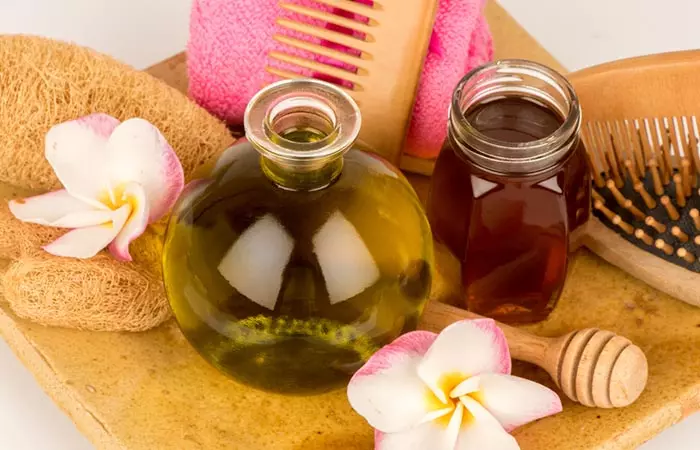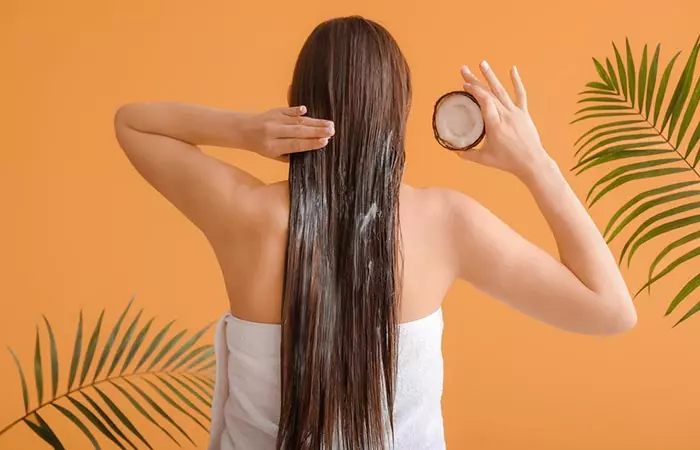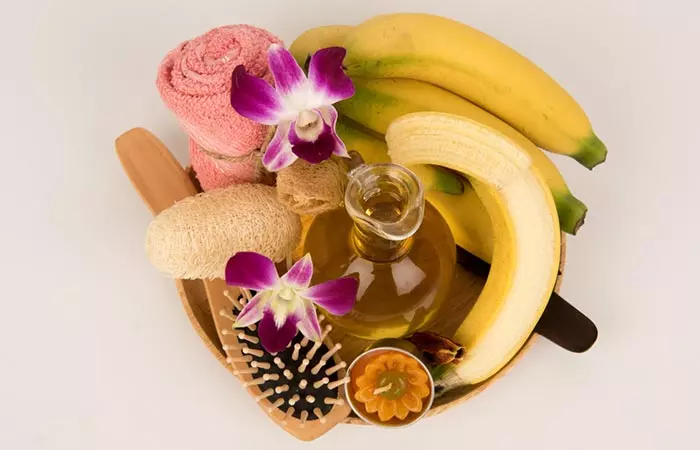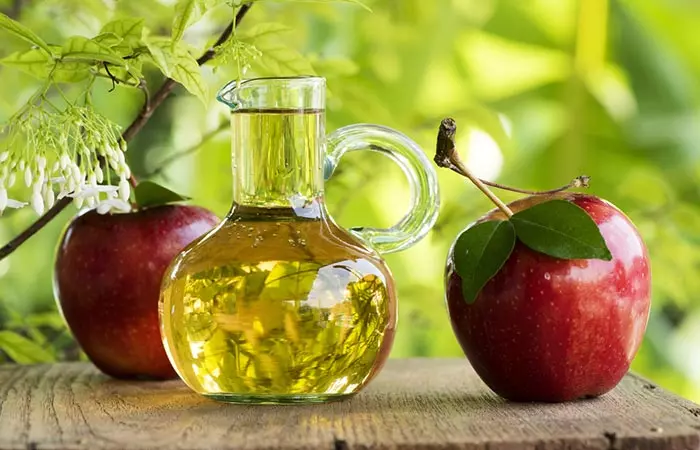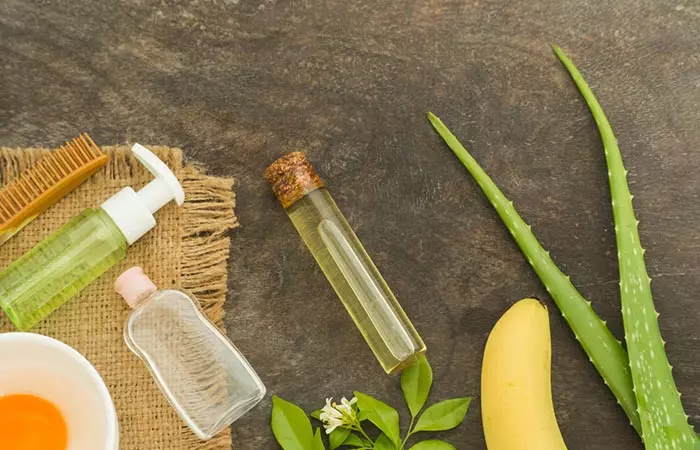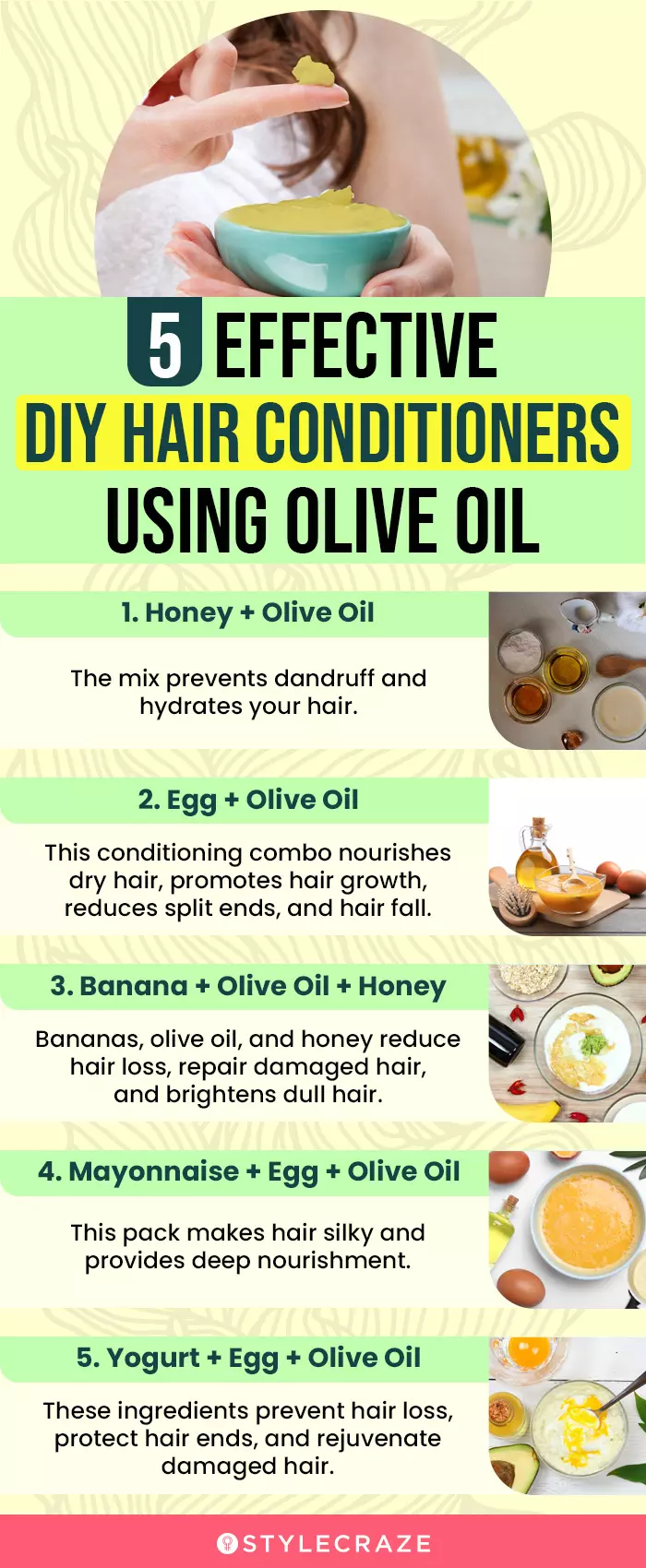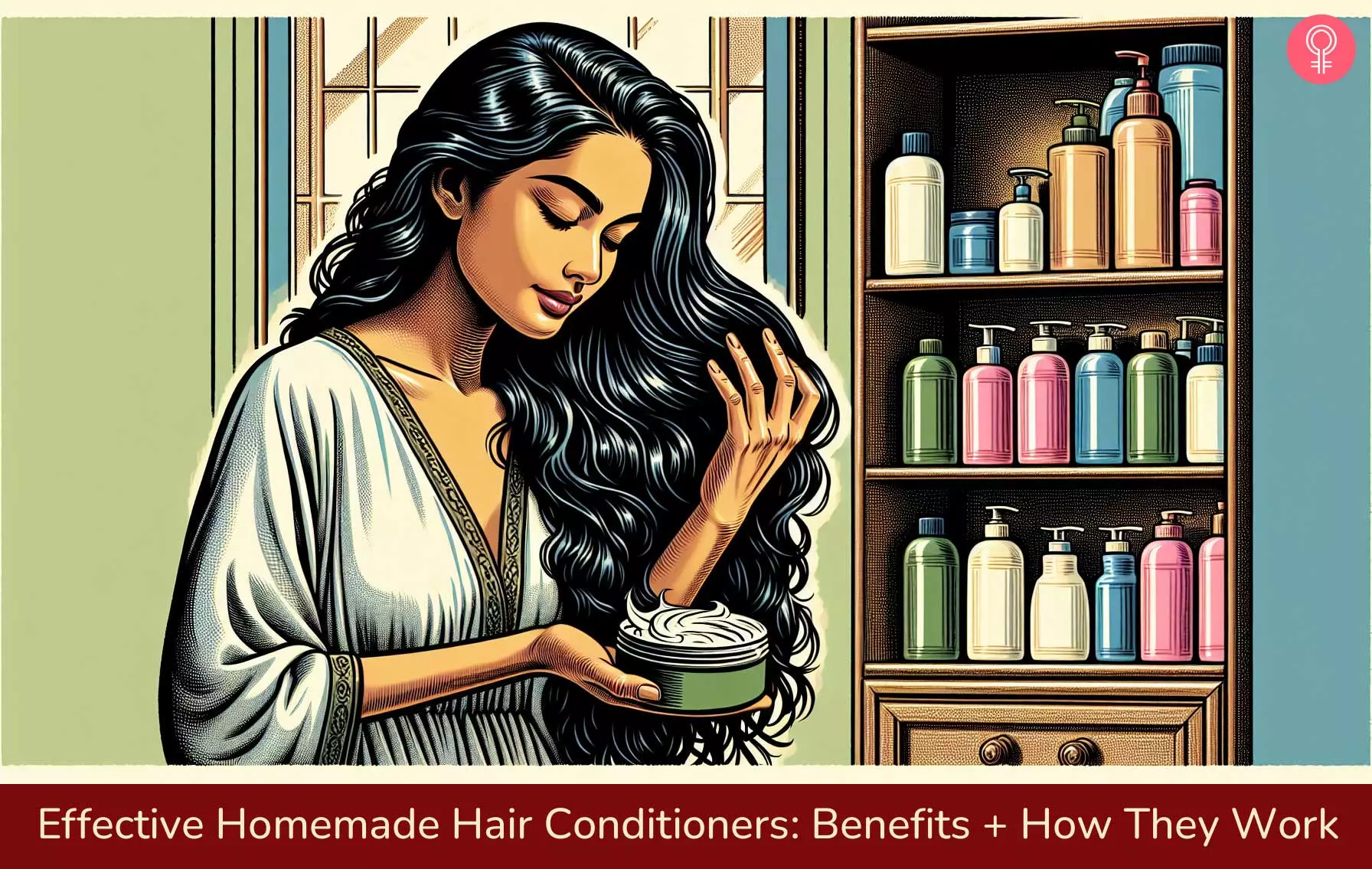Using chemical-filled conditioners on your hair, on the other hand, can be harmful in the long run. Thankfully, all you need are some homemade hair conditioners. After all, pricey store-bought products do not do much to mend and renew dry and damaged hair. Yes, you read that correctly. In this article, we have listed some of the best natural hair conditioners you can prepare at home. Check them out!
How Do Hair Conditioners Work?
We know that conditioners help rejuvenate hair by repairing damaged, dry, or chemically-treated hair, but how exactly does a hair conditioner work? When applied to the hair shaft, they keep the scale like-tiles of the cuticle intact. The protein within these ingredients binds with the keratin in the hair and strengthens the hair shaft (1). There are many benefits of conditioning your hair. Check them out below.
Benefits Of Hair Conditioners
Whether you have natural kinky, curly, wavy, or straight hair, hair conditioners give your hair the moisture it needs. Now, let’s get to the DIY homemade hair conditioners! Note: Before using these homemade conditioners, rinse your hair with warm water to open up the cuticles and help the conditioner reach the hair follicle. Since these are homemade conditioners, they can be applied to the scalp.
Choosing Ingredients For Your Hair Type
Here is a quick guide to choosing the best ingredients for your specific hair type:
Dry Hair: For dry hair go for rich, nourishing ingredients that can lock in hydration such as coconut oil, shea butter, and honey. For extra dry or damaged hair, ingredients like egg yolk and avocado. These ingredients will deliver essential proteins and vitamins to repair the strands. Oily Hair: Opt for aloe vera or apple cider vinegar to balance scalp oil without weighing down the hair. Apple cider vinegar (ACV) also helps reduce excess oil production. Curly Hair: Curls need extra hydration and definition. Go for shea butter, coconut oil, and aloe vera to hydrate and define curls. Fine or Thin Hair: Choose lightweight oils like argan or jojoba for proper nourishment. They aren’t too greasy, so, your hair doesn’t look too flat.
Choosing the right ingredients for your hair type ensures that your DIY conditioner addresses your hair’s unique needs, leaving you with gorgeous, manageable locks. Scroll down to check out some of the most effective DIY hair conditioners.
12 Homemade DIY Hair Conditioners Using Ingredients From Your Kitchen!
Caution:Before using these homemade conditioners on your hair, do a patch test on your arm to see if they suit your skin or cause irritation. If your skin becomes red or itchy, consult a doctor before trying them.
1. Homemade Hair Conditioner With Honey And Olive Oil
Both olive oil and honey are natural conditioners that help hydrate and nourish your hair (3). Honey also helps prevent dandruff caused by seborrheic dermatitisi A skin disorder that causes red, inflamed, scaly patches that commonly affect the scalp or any other oily areas on the skin. (4).
2 tablespoons honey 4 tablespoons olive oil Shower cap
30 minutes Once a week, or twice a month.
2. Homemade Hair Conditioner With Egg And Olive Oil
The yolk of an egg can be extremely hydrating as it also contains fats. The egg yolk helps promote hair growth (5). It also helps preserve hair endings and rejuvenate damaged hair. It helps reduce hair loss, dandruff, and baldness and acts as a good natural conditioner for hair (3). This hair conditioner is great for dry hair.
2 egg yolks 2 tablespoons olive oil Water
1-2 hours Once a week.
3. Homemade Hair Conditioner With Coconut Oil
Coconut oil is an excellent hair conditioner that works wonders for your hair with extended use. It contains fatty acids with penetrative properties that help nourish and condition your hair from deep within (2). For those looking to make a coconut oil conditioner at home, the recipe shared below is the easiest to follow and is perfect for restoring moisture and enhancing shine.
3 tbsp Coconut Oil Hot Towel
45 minutes 2-3 times a week.
4. Homemade Hair Conditioner With Shea Butter
Shea butter is an abundant source of fatty acids and oils. It is rich in vitamin C and has antioxidant and anti-inflammatory properties that help keep scalp infections and dandruff at bay (6). Shea butter is widely used as a conditioner, especially by women with kinky hair. Anecdotal evidence suggests that it tames frizz, reduces split ends, protects damaged hair, and hydrates your hair. Shea butter is one of the best natural scalp treatments which you can avail yourself sitting at home.
1 tablespoon shea butter 2 tablespoons coconut oil 1 teaspoon argan oil 2-3 drops of an essential oil of your choice (Optional)
30 minutes 2-3 times a week. Ela Gale, a Youtuber, shared her experience with homemade hair conditioners and how she benefits from them. She says, “It is really easy to use and makes my hair really nourished and conditioned (i).” She mixes shea butter, coconut oil, vitamin E oil, lavender and rosemary essential oil, then uses the blend on her dry tresses.
5. Homemade Hair Conditioner With Baking Soda
Baking soda is an effective ingredient for removing the dirt and build-up from your hair and scalp. It has antifungal properties that keep your scalp clean and prevent scalp infections (7). Note: Use only the recommended amount of baking soda. Using too much baking soda can lead to scalp irritation and hair damage due to its pH level.
1/4 cup baking soda 1/2 cup conditioner Plastic bag Hot towel
1 hour Once a month
6. Homemade Hair Conditioner With Banana
Banana is an excellent source of silica (8). Silica helps reduce hair loss and makes the hair brighter (9). It also helps condition your hair and replenishes damaged hair endings, making your tresses soft and bouncy (3). This homemade banana hair conditioner is most commonly used with olive oil as a remedy for hair. When combined with olive oil, it creates a good conditioning mix.
1 ripe banana 2 tablespoon olive oil 1 tablespoon honey Shower cap
30 minutes Once a week.
7. Homemade Hair Conditioner With ACV And Guar Gum
Guar gum is used in many hair conditioners and shampoos as a conditioning agent (10). It helps add body and thickness to the hair. Although research has not been done on the benefits of apple cider vinegar for hair, anecdotal evidence suggests that it helps reduce dandruff and maintain the pH level of your hair.
2 cups water 2 teaspoon guar gum 1 teaspoon carrier oil (olive oil, coconut oil, or jojoba oil) 1/2 cup apple cider vinegar 10-20 drops rosemary essential oil
5 minutes 2-3 times a week.
8. Homemade Hair Conditioner With Apple Cider Vinegar
Anecdotal evidence suggests that apple cider vinegar moisturizes your hair and makes it shiny and easier to detangle. Many kinky-haired bloggers recommend ACV for cleansing curly hair and as a natural conditioner. This is one of the best homemade conditioners for curly hair as it helps to enhance curl definition and reduce frizz.
2 tablespoons apple cider vinegar 1 cup water
5 minutes Once every fortnight.
9. Homemade Hair Conditioner With Mayonnaise And Egg
Mayonnaise is one of the most popular remedies for hair loss, dryness, and lice. Though there is no scientific evidence to back this up, there is quite a bit of anecdotal evidence. Mayonnaise contains oils that deeply condition your hair while eggs are packed with proteins that provide nourishment. This pack helps make your hair silky and manageable.
2 whole eggs 5 tablespoons mayonnaise 1 teaspoon olive oil
20 minutes Once a week.
10. Coconut Milk Hair Conditioner
Coconut milk and its extracts are great emollientsi Substances that soften and smoothen the hair and reduce itching and dryness thanks to their moisturizing properties. for hair. It is vitamin-enriched, containing vitamins B, C, and E that help maintain hair health (11).
1 1/2 tablespoon coconut milk 1 tablespoon shampoo
5 minutes 2-3 times a week.
11. Yogurt Hair Conditioner
Yogurt and olive oil are great for your hair. Yogurt helps in protecting the hair endings, rejuvenating damaged hair, and reducing baldness. Olive oil is known to protect hair from damage, dandruff, and hair loss (3).
1 egg 1 teaspoon olive oil 2 tablespoons yogurt Shower cap
5 minutes Once every two weeks.
12. Aloe Vera And Banana Hair Conditioner
Aloe vera has been used to reduce hair loss since 70 AD (12). It contains vitamins, minerals, amino acids, and salicylic acid. Salicylic acid is known to help treat alopecia and dandruff (13),(14). Banana is rich in vitamin B, which is important for preventing hair loss (15). This is an effective plant-based hair conditioner to combat scalp-related issues.
1 fresh aloe vera leaf (filled with gel) 2 medium-sized bananas Shower cap
5 minutes Discover how to make your own effective DIY hair conditioner with simple pantry ingredients. Watch this easy-to-follow video to help you achieve the beautiful hair you have always wanted. What is the best thing for extremely dry hair? Check out the infographic below to find out 5 easy and effective ways of using olive oil for making conditioners at home.Illustration: StyleCraze Design Team According to Dr. Michael May, MD, a hair transplant surgeon, “Obtaining more moisturization will help bring back the shine. Curly hair formulas are incredibly helpful in hydrating the hair.” Can I leave the conditioner overnight? Dr. May says, “It depends on what kind of hair conditioner you are using. It is best to use conditioners based on what is instructed on the packaging. Leaving it for longer than what is instructed can do more damage than good.” What is the right way to apply hair conditioner? Apply the conditioner from the roots to the tips of your hair. Massage the conditioner into your scalp after rinsing your hair with hot water. This helps the conditioner reach the hair follicles. Can conditioners help rejuvenate split ends? Split ends arise when the hair cuticle tiles split and expose the cortex. Conditioners are protein-rich and those proteins bind with the keratin in the hair cuticle to strengthen it. How long should I leave in a conditioner? There are two types of conditioners: leave-in conditioners and wash-off conditioners. Wash-off conditioners are applied right after shampooing the hair. You need to leave them on for 5 to 10 minutes before washing them off. Leave-in conditioners are applied after stepping out of the shower. They can be left in the hair until the next wash. If you want to deep condition your hair, leave it on your hair for no more than 30 minutes. What is the difference between a conditioner and a deep conditioner? A regular conditioner is thinner in consistency and will nourish your hair at a surface level. Deep conditioners are thicker in consistency and keep your hair hydrated for a longer time. They also condition your hair from within. Deep conditioning nourishes and strengthens hair leaving them healthy and shiny. What happens if you don’t rinse out a deep conditioner? If you do not rinse out your deep conditioner, it can leave a residue behind on your hair. This residue will clog your hair follicles and make your hair heavy, sticky, and oily.
Illustration: Effective Homemade Hair Conditioners: Benefits + How They Work
